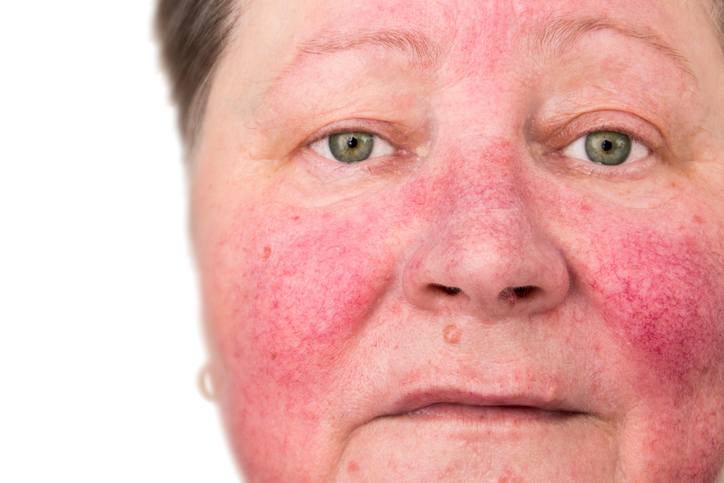Seasonal as it might be, having a red nose isn’t something most adults embrace, no matter how it may glow through the fog. Rosacea, which can cause facial redness, flushing, visible blood vessels, acne and in some cases a thickening of the skin on the nose, can also cause embarrassment for many people. Others often think it is a result of drinking too much alcohol. But while alcohol may be a trigger for a flare up for some, people who don’t drink any alcohol can still have severe rosacea.
According to the American Academy of Dermatology, adults with fair skin, light hair and blue eyes (often from Celtic or Scandinavian ancestry) are most likely to suffer from rosacea. It tends to run in families and while the jury is still out on the cause of rosacea, there are a number of treatments available through a dermatologist. There is no cure and some people will have flare ups throughout their lives.
Keeping a journal to track triggers of rosacea flares can help patients learn what lifestyle choices may affect their condition. In many cases, stress, certain foods and beverages or exposure to sunlight can cause a reaction.
Managing Rosacea
- Keep a trigger journal – hot drinks, red wine, caffeine and spicy foods commonly cause flares
- Hot and cold can aggravate rosacea; avoid over-heating or extreme cold
- Avoid very hot showers
- Protect skin from wind and cold with a non-wool, soft scarf
- Use sunscreen daily to protect skin from exposure – use a non-chemical, broad spectrum sunscreen with a SPF of at least 30
- Avoid scrubbing or rubbing face
- Keep hair products away from face
- Use only very gentle, fragrance free and allergy tested products on face to cleanse and moisturize. See a dermatologist to develop a skin care plan.
In 2015, the FDA approved a new prescription treatment for rosacea manufactured by Bayer Healthcare. Finacea (azelaic acid) Foam 15 per cent, was approved for mild to moderate rosacea and was found to help with the pimples and redness of this chronic condition. Laser and light therapy, in addition to other prescription treatments, may also help patients manage the symptoms of rosacea. To learn more, talk with a dermatologist.
For makeup tips, men’s shaving tips and more information visit the National Rosacea Society website at https://www.rosacea.org/patients/skincare/makeuptips.php .






Add Your Voice
0 Comments
Join the Discussion